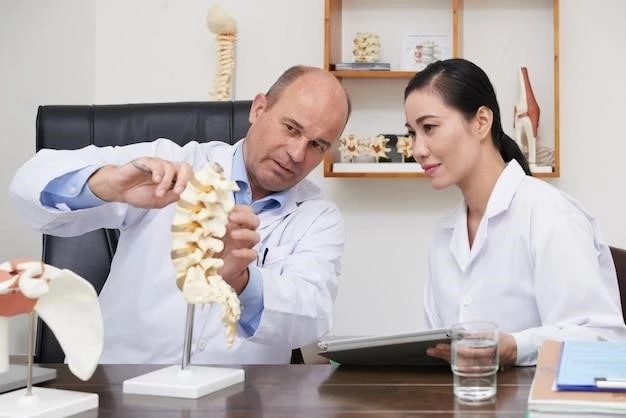Overview of Carpotarsal Osteolysis Syndrome
Understanding Carpotarsal Osteolysis Syndrome is crucial. This overview will provide insight into the condition and its impact on affected individuals.
Description
Carpotarsal Osteolysis Syndrome is a rare genetic disorder characterized by the progressive loss of bone in the hands, feet, and ankles. The condition leads to pain, deformity, and limited mobility, impacting the individual’s quality of life. Understanding the symptoms and treatment options is essential for managing this syndrome effectively.
Genetic Causes of Carpotarsal Osteolysis
Understanding the genetic factors behind Carpotarsal Osteolysis is crucial for diagnosis and tailored treatment. Consult a genetic counselor for in-depth insights.
Inheritance Pattern
The inheritance pattern of Carpotarsal Osteolysis is autosomal dominant, meaning an affected individual has a 50% chance of passing the gene mutation to their offspring. Genetic testing and counseling play a key role in understanding the risk of transmission. Consult with a healthcare provider or genetic counselor for personalized guidance on family planning and genetic implications.
Symptoms and Diagnosis of Carpotarsal Osteolysis
Recognizing symptoms early is crucial. Consult a healthcare provider for accurate diagnosis and personalized treatment plan.
Common Symptoms
The common symptoms of Carpotarsal Osteolysis include bone pain, swelling, joint deformities, limited range of motion, and fractures. Early detection of these signs is key for prompt management. If you or a loved one experience any of these symptoms, seek medical attention for evaluation and appropriate care. Regular monitoring and follow-ups are important to track the progression of the condition and adjust treatment strategies accordingly.
Diagnostic Methods
Diagnosing Carpotarsal Osteolysis typically involves imaging tests like X-rays, CT scans, and MRIs to assess bone abnormalities. Genetic testing may be recommended to identify specific gene mutations. Blood tests can help evaluate bone health and rule out other conditions. A thorough physical examination and medical history review are crucial for an accurate diagnosis. It’s essential to consult with a healthcare professional specializing in bone disorders for a comprehensive evaluation and tailored treatment plan.
Treatment Options for Carpotarsal Osteolysis
Explore various medical interventions available for managing Carpotarsal Osteolysis. Consult with healthcare providers for personalized treatment plans.
Medical Interventions
Medical interventions for Carpotarsal Osteolysis may include pain management strategies, physical therapy to improve mobility, orthopedic devices for support, and surgical interventions to address severe bone damage. Consult with a multidisciplinary team of healthcare professionals, including orthopedic specialists, pain management experts, and physical therapists, to explore the most appropriate treatment options for your individual needs. Regular monitoring and follow-ups are essential to track progress and adjust the treatment plan accordingly.
Research Advances in Carpotarsal Osteolysis Syndrome
Stay informed about the latest research developments in Carpotarsal Osteolysis to understand potential new treatment options. Consult with healthcare providers for updates.
Recent Discoveries
Recent research in Carpotarsal Osteolysis has focused on understanding the underlying genetic mechanisms, exploring targeted therapies, and enhancing supportive care strategies. Scientists continue to make progress in unraveling the complexities of this rare condition, leading to potential breakthroughs in treatment modalities. Stay informed about the latest findings by engaging with reputable medical resources and discussing updates with your healthcare team. Participating in clinical trials may also provide access to innovative treatments and contribute to advancing scientific knowledge in the field. Keep abreast of emerging discoveries to make informed decisions about your care and well-being.

Prognosis and Long-Term Outcomes of Carpotarsal Osteolysis
Understand the long-term outlook and potential impacts of Carpotarsal Osteolysis to better plan for ongoing care and management.
Prognostic Factors
Prognosis in Carpotarsal Osteolysis can vary based on individual factors such as disease progression, response to treatment, and overall health status. Monitoring bone health, managing symptoms effectively, and maintaining a healthy lifestyle can positively impact long-term outcomes. Regular follow-ups with healthcare providers, adherence to treatment plans, and staying informed about the condition are crucial for improving prognosis. Engage in open communication with your medical team to address any concerns and optimize your care for better long-term results.
Management of Pain in Carpotarsal Osteolysis Patients
Discover effective pain relief strategies tailored to alleviate discomfort associated with Carpotarsal Osteolysis. Seek expert guidance for personalized care.
Pain Relief Strategies
Managing pain in Carpotarsal Osteolysis patients may involve a combination of medications, physical therapy, heat or cold therapy, and lifestyle modifications. Non-steroidal anti-inflammatory drugs (NSAIDs) can help reduce inflammation and alleviate pain. Physical therapy exercises aimed at improving flexibility and strength can enhance joint function and reduce discomfort. Applying heat or cold packs to affected areas may offer relief. Lifestyle changes such as maintaining a healthy weight and avoiding activities that exacerbate pain can also contribute to better pain management. Consult with your healthcare provider to develop an individualized pain relief plan tailored to your specific needs and preferences.
Supportive Care for Individuals with Carpotarsal Osteolysis
Explore psychosocial support options to manage the emotional impact of Carpotarsal Osteolysis. Seek assistance for holistic care and well-being.
Psychosocial Support
Coping with Carpotarsal Osteolysis can be challenging emotionally. Seek guidance from counselors, support groups, and mental health professionals to navigate feelings of anxiety, depression, or isolation. Sharing experiences with others facing similar challenges can provide comfort and encouragement. Developing coping strategies, practicing mindfulness, and maintaining open communication with loved ones can promote mental well-being. Remember, psychological support is an integral part of overall care for individuals with chronic conditions. Prioritize your mental health alongside physical management for a more holistic approach to wellness.
